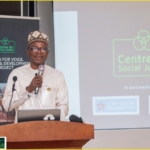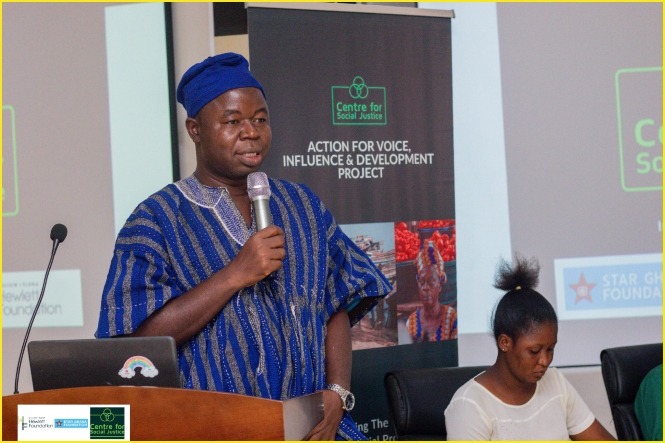
The Northern Region Minister, Ali Adolf John, has commended the Centre for Social Justice (CSJ) for its continued efforts to drive inclusive financial reforms that uplift informal sector workers – the backbone of Ghana’s economy.
Speaking at the second Regional Forum on Financial Inclusion and Social Protection for Informal Sector Workers, held in Tamale on Thursday, Oct. 16, the Minister noted that access to finance should be treated as a fundamental right, not a privilege.
“If we are serious about boosting our local economies, we must make it easier for traders, artisans, and farmers to access finance and social protection programs that safeguard their rights and livelihoods,” the minister said, adding that his office would continue working closely with CSJ and development partners to promote inclusive growth.

Building on the Kumasi Momentum
Thursday’s event, held at the Mariam Hotel, followed the success of the inaugural dialogue in Kumasi earlier this year. Organized by the Centre for Social Justice (CSJ) in partnership with the STAR-Ghana Foundation and the William & Flora Hewlett Foundation, the Tamale forum brought together stakeholders from across the Northern and Upper East regions, including market women, smallholder farmers, policymakers, financial institutions, and civil society actors.
The discussions focused on identifying barriers to financial access and co-creating practical solutions that make services more affordable and responsive to the needs of Ghana’s informal economy. In Ghana, the informal sector employs between 80 and 90 percent of the national labor force.
Data Underscore the Urgency
CSJ’s findings presented at the forum underscored the stark inequalities that persist in northern Ghana. While the informal sector provides four out of every five jobs, it contributes only about a quarter of the country’s GDP, a productivity gap tied to limited access to credit, pensions, and insurance.
In Tamale, the number of business establishments grew from 9,920 in 2014 to 27,903 in 2024, signaling remarkable entrepreneurial spirit. Yet poverty remains widespread: Savannah (49.5%), North East (48.1%), Upper East (43%), and Northern (38.4%), compared to the national rate of 24.3%.
Delivering remarks on behalf of CSJ Executive Director Professor Alexander Manu, Finance Fellow Haruna Alhassan stressed that financial inclusion and social protection are critical levers for poverty reduction.

“When finance is accessible and protection dependable, livelihoods become resilient and communities thrive,” Alhassan said.
A Roadmap for Inclusion
The Tamale dialogue concluded with a proposed roadmap for inclusive finance, urging collaboration among banks, fintech firms, and regulatory bodies such as the National Pensions Regulatory Authority (NPRA) and National Insurance Commission (NIC).
Proposals included:
*The development of micro-insurance and input credit schemes for farmers and traders.
- Simplified onboarding for pension and health insurance programs.
- Fairer claims processes and grievance redress systems for informal workers.
Participants declared that inclusive finance can only succeed when solutions are people-centered — tailored to the realities of the market women, artisans, and farmers who sustain Ghana’s economy.
Partnership for Progress
Hon. Ali Adolf John lauded CSJ and its partners for their grassroots approach, urging other regional bodies to replicate the model.
“When public, private, and civil society actors work together, we can make inclusive finance a reality for those who need it most,” he said.
The CSJ, a policy think tank known for its advocacy on fairness and accountability, continues to push for national financial reforms that integrate informal sector workers into the mainstream economy.
The next regional forum is expected to convene in Accra in early 2026, marking another step toward a unified national framework for inclusive finance and social protection.
